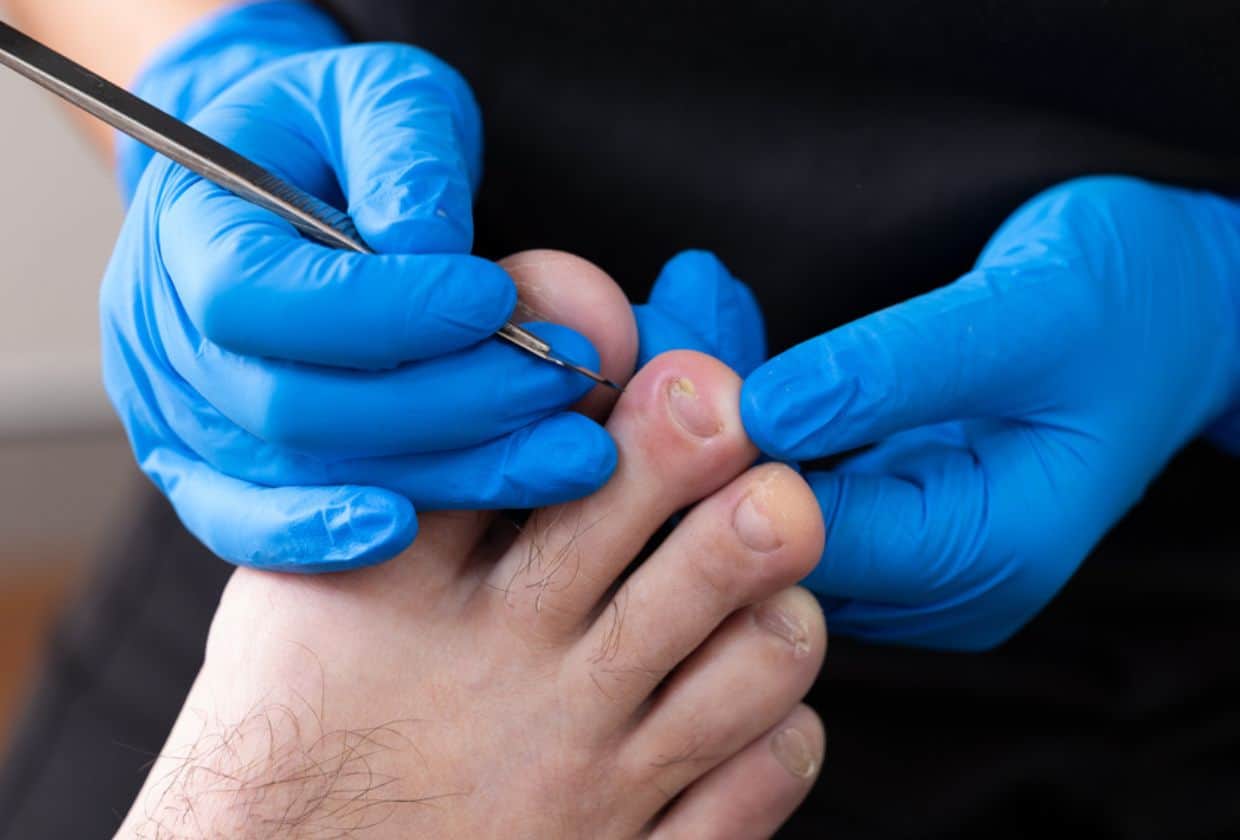An ingrown toenail is a common and painful condition that occurs when the edge of a toenail grows into the surrounding skin instead of straight out. This can lead to redness, swelling, tenderness, and sometimes infection in the affected area.
While it may be tempting to see if your ingrown toenail goes away on its own, they typically do not, and will usually require attention from a podiatrist or healthcare professional. This is where our caring, and professional team at Advance Foot Clinic Podiatry come in.

At Advance Foot Clinic Podiatry, our experienced and qualified team of podiatrists are dedicated to providing the very best care possible for our patients. We will do everything we can to ensure that your ingrown toenail treatment is as pain-free as possible, and our experienced team can help prevent ingrown toenails from reoccurring.
Advance Foot Clinic Podiatry is an established clinic with an excellent reputation in each of our five Queensland clinics. You can book your podiatrist ingrown toenail treatment appointment with a caring podiatrist from our team at any of our locations, which include:
Ingrown toenails occur when part of the nail penetrates the skin, which can often result in an infection. The ingrown nail can also apply pressure in the nail sulci (where your toenail meets the skin) without penetrating the skin and while this isn’t an ingrown nail as such, it can be painful and often results in the formation of a corn or callus in the nail sulci.
The following factors are the main contributors that make ingrown toenails more likely to occur:
If you notice the signs of an ingrown toenail, such as redness, swelling, pain, or signs of infection, it’s a good idea to seek professional help from a podiatrist or medical professional. A podiatrist can properly assess the condition, provide appropriate treatment, and offer guidance on how to prevent future ingrown toenails. Ignoring an ingrown toenail can lead to worsening pain and potential complications, so it’s best to address it promptly with the help of a healthcare expert.
Attempting to treat an ingrown toenail at home, especially if it’s infected or recurrent, can lead to complications, so professional care is always advised. These are the ingrown toenail treatment options that your medical professional or podiatrist will usually offer.
Antibiotics are commonly prescribed by General Practitioners to help treat infected ingrown toenails, however the nail edge remains and the ingrown toenail will likely recur. Thus, it is advised to see your podiatrist to discuss treatment options to prevent further discomfort and reoccurrence.
As with most conditions, prevention is the best cure. You can prevent ingrown toenails by ensuring that you use correct nail trimming techniques when you trim your toenails, wear the right footwear, and follow other preventative measures that a podiatrist maycan recommend.
Ingrown toenails can cause significant discomfort, and the issue can continue to present itself if the correct measures are not taken. This makes it important to address an ingrown toenail quickly to prevent further complications.
It’s best to go to a healthcare provider, or an experienced podiatrist, like Advance Foot Clinic who specialises in treating common foot conditions. Our experienced, efficient, and qualified team can treat the ingrown toenail in order to address the issue and help prevent it from recurring.
Podiatrists treat ingrown toenails by:
At Advance Foot Clinic Podiatrists, our trained professionals can easily remove the corner or spike that has penetrated the skin, a procedure that generally causes little discomfort.
If the ingrown nail is too painful or is too deep, a local anaesthetic will be used in conjunction with a minor surgical procedure which is performed at our offices. We now also offer a pain-free anaesthetic option for ingrown toenail surgery.
Until the problematic wedge of nail that is causing the ingrown toenail is removed, infection will reoccur. This is why it’s important to seek professional help from a podiatrist or medical professional experienced in ingrown toenail treatments.
Recurring ingrown nails may need to have the edge permanently removed with a minor surgical procedure. Advance Foot Clinic uses a phenol based chemical during surgery which sterilises the nail bed to minimise the likelihood of a recurrence.
In very severe cases or when there are complications, surgical intervention may be necessary. This can include removing the entire nail and potentially addressing any infection or damaged tissue,. Nail Matrix Ablation is one example of this.
While the technical name may sound scary, don’t be alarmed if you’ve heard your podiatrist mention this procedure. If an ingrown toenail is more severe or keeps occurring, a podiatrist may perform a procedure known as partial nail avulsion. It basically means a partial nail removal. This procedure is sometimes referred to as an ingrown toenail removal procedure. During this procedure, a portion of the ingrown nail, or the entire nail, is carefully removed. Ingrown toenail removal is typically done under local anaesthesia to minimise pain. At our podiatry clinics, we always prioritise your comfort and wellbeing, for any ingrown toenail surgery, treatment or procedure. If an ingrown toenail removal, or part removal is needed, we will always use local anaesthetic.
In some cases of recurring ingrown toenails, a podiatrist may recommend a more permanent solution, called a nail matrix ablation. This procedure involves removing a portion of the nail matrix (the tissue that produces the nail) to prevent the ingrown nail from growing back. Sometimes your nail simply grows too wide, and this procedure can correct that. This is a procedure performed by surgeons and is invasive. Contact us to learn more about alternatives.
If you have been struggling with an ingrown toenail, or recurring ingrown toenail issues, there is an easy solution. Book your appointment at any of our five Queensland podiatry clinics today and you can relieve your ingrown toenail pain for good.
Ready to give your feet the care they deserve? Book your appointment online or call us and experience our expert podiatry services at any of our six clinic locations.